六年级英语下册重点句型
六年级下册英语句型
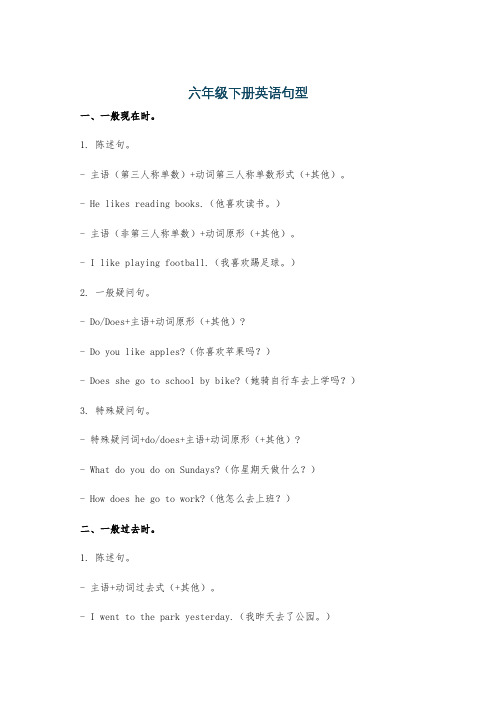
六年级下册英语句型一、一般现在时。
1. 陈述句。
- 主语(第三人称单数)+动词第三人称单数形式(+其他)。
- He likes reading books.(他喜欢读书。
)- 主语(非第三人称单数)+动词原形(+其他)。
- I like playing football.(我喜欢踢足球。
)2. 一般疑问句。
- Do/Does+主语+动词原形(+其他)?- Do you like apples?(你喜欢苹果吗?)- Does she go to school by bike?(她骑自行车去上学吗?)3. 特殊疑问句。
- 特殊疑问词+do/does+主语+动词原形(+其他)?- What do you do on Sundays?(你星期天做什么?)- How does he go to work?(他怎么去上班?)二、一般过去时。
1. 陈述句。
- 主语+动词过去式(+其他)。
- I went to the park yesterday.(我昨天去了公园。
)- He had a good time last week.(他上周过得很愉快。
)2. 一般疑问句。
- Did+主语+动词原形(+其他)?- Did you see him last night?(你昨晚看见他了吗?)3. 特殊疑问句。
- 特殊疑问词+did+主语+动词原形(+其他)?- Where did you go last weekend?(你上周末去哪里了?)三、There be句型。
1. 肯定句。
- There is/are+主语(+其他)。
- There is a book on the desk.(桌子上有一本书。
)- There are some trees in the park.(公园里有一些树。
)2. 否定句。
- There is/are+not+主语(+其他)。
- There isn't any water in the glass.(杯子里没有水。
六年级英语下册重点句子短语归纳

六年级英语下册重点句子短语归纳:第一单元①how tall are you ? I’m 164 cm tall。
[你有多高/}②how old are you ? I’m 14 years old .【你有多大]③how heavy are you ?I’m 48kg。
[你有多重]4。
how big are your feet? Iwear size 17。
[你的脚有多大]5。
how long are your legs?76cm.[你的腿有多长】6.I'm older than you . I’m 4years older than you。
【我比你更大,我比你大4岁】7。
I’m taller than you . I’m 4cm taller than you.[我比你更高,我比你高4厘米]8。
how large is your room?【你的房间有多大‘询问房间用‘large'】注:只要在此类句子中加‘数字‘,数字都加在be 动词后面【即am is are 】第二单元①how do you feel ?[或how are you feeling]___I feel sick.[你感觉怎么样?我感觉不舒服]②what’s the matter ?[with you] ==what's wrong with you ?[你怎么了]My throat is sore . my nose hurts .[我喉咙疼,我鼻子疼]这个问题的答案还有:I have a fever /have a cold /have a toothache /have a headache/ the flu] 注;当人称为第三人称单数时用has.My leg hurts [我腿疼]3 询问第三人称单数[包括he she it 人名Amy 亲属]的感受是就不能说how do you feel?要说how does ***feel ? 例如:How does Amy feel ?She is tired累/bored烦、angry生气、excited兴奋、happy高兴。
小学英语六年级下册句子及词语

【导语】假如⽣活是⼀条河流,愿你是⼀叶执著向前的⼩⾈;假如⽣活是⼀叶⼩⾈,愿你是个风⾬⽆阻的⽔⼿。
以下是®⽆忧考⽹为⼤家整理的《⼩学英语六年级下册句⼦及词语》供您查阅。
Unit1 How tall are you?⼀、重点单词:tall—taller更⾼的、short—shorter 更矮的、 strong—strong更强壮的、old—older年龄更⼤的、young—younger 更年轻的、big—bigger更⼤的heavy—heavier 更重的、 long—longer 更长的、 thin—thinne更瘦的、small—smaller 更⼩的、low—lower更低的、smart—smarter更聪明的dinosaur恐龙、 hall⼤厅、meter ⽶、than⽐、 both 两个都、 kilogram千克,公⽄、 countryside乡村、shadow阴影,影⼦、 become开始变得,变成⼆、重点句式:1、That's the tallest dinosaur in this hall.那是这个厅⾥的恐龙。
2、You're older than me. 你⽐我⼤。
3、How tall are you ?你有多⾼? I'm 1.65 metres.我⾝⾼1.65⽶。
4、What size are your shoes ?你穿多⼤号的鞋?5、My shoes are size 37. 我穿37号的鞋。
6 、Your feet are bigger than mine .你的脚⽐我的⼤。
7、How heavy are you ?你有多重? I'm 48 kilograms .我体重48公⽄。
8、It's taller than both of us together .它⽐我们俩加在⼀起还⾼。
三、知识点:1、形容词变为⽐较级的变化规则:(1)⼀般情况下,在形容词的词尾直接加er。
人教版六年级英语下册 重点句型语法总结
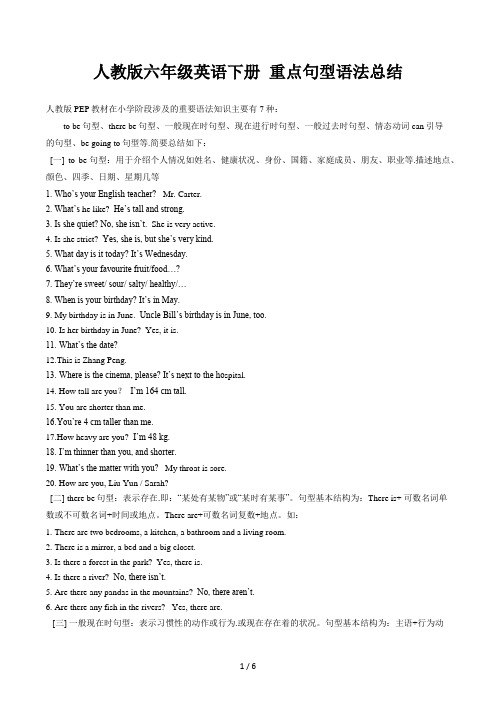
人教版六年级英语下册重点句型语法总结人教版PEP教材在小学阶段涉及的重要语法知识主要有7种:to be句型、there be句型、一般现在时句型、现在进行时句型、一般过去时句型、情态动词can引导的句型、be going to句型等.简要总结如下:[一] to be句型:用于介绍个人情况如姓名、健康状况、身份、国籍、家庭成员、朋友、职业等.描述地点、颜色、四季、日期、星期几等1. Who’s your English teacher? Mr. Carter.2. What’s he like? He’s tall and strong.3. Is she quiet? No, she isn’t. She is very active.4. Is she strict? Yes, she is, but she’s very kind.5. What day is it today? It’s Wednesday.6. What’s your favourite fruit/food…?7. They’re sweet/ sour/ salty/ healthy/…8. When is your birthday? It’s in May.9. My birthday is in June. Uncle Bill’s birthday is in June, too.10. Is her birthday in June? Yes, it is.11. What’s the date?12.This is Zhang Peng.13. Where is the cinema, please? It’s next to the ho spital.14. How tall are you?I’m 164 cm tall.15. You are shorter than me.16.You’re 4 cm taller than me.17.How heavy are you? I’m 48 kg.18. I’m thinner than you, and shorter.19. What’s the matter with you? My throat is sore.20. How are you, Liu Yun / Sarah?[二] there be句型:表示存在.即:“某处有某物”或“某时有某事”。
六年级下册英语句子汇总

六年级下册英语句子汇总六年级下册英语句子1:do you have any brothers or sisters 你有兄弟或姐妹吗?2:work makes the workman.勤工出巧匠。
3:Only fantasy and action, can never realize the joy of harvest.只会幻想而不行动的人,永远也体会不到收获果实时的喜悦。
4:if i cried for every time that i thought about you i would end up drowning.如果每次想起你我都要哭的话,我将会最终被淹死。
5:Your entire staff wishes you and yours a most happy Christmas.全体职员祝您及家人圣诞快乐。
6: Who do you think you are?你以为你是谁?7:Cowardly people will only come to a standstill, recklessly person can lead to Shaoshen, only the real brave man to carry the world before one.懦弱的人只会裹足不前,莽撞的人只能引为烧身,只有真正勇敢的人才能所向披靡8:all the same 仍然,照样的9:love is like a butterfly. it goes where it pleases and it pleases where it goes. 爱情就像一只蝴蝶,它喜欢飞到哪里,就把欢乐带到哪里。
10:just because someone doesn‘t love you the way you want them to, doesn‘t mean theydon‘t love you with all they have. 爱你的人如果没有按你所希望的方式来爱你,那并不代表他们没有全心全意地爱你。
人教版六年级英语下册各单元必背词汇和句型
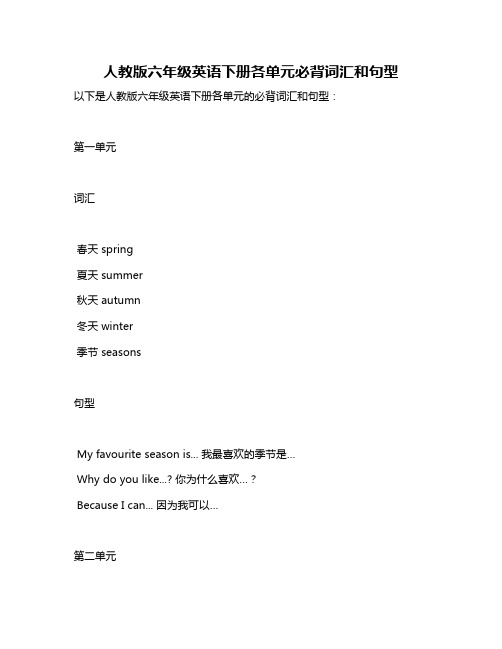
人教版六年级英语下册各单元必背词汇和句型以下是人教版六年级英语下册各单元的必背词汇和句型:第一单元词汇春天 spring夏天 summer秋天 autumn冬天 winter季节 seasons句型My favourite season is... 我最喜欢的季节是…Why do you like...? 你为什么喜欢…?Because I can... 因为我可以…第二单元词汇游泳 swim滑冰 skate放风筝 fly a kite堆雪人 make a snowman季节活动 seasonal activities句型What do you do in the...? 你在…做什么?I usually... 我通常…Do you often...? 你经常…吗?Yes, I do. / No, I don’t. 是的,我经常。
/ 不,我不经常。
第三单元词汇星期一 Monday星期二 Tuesday星期三 Wednesday星期四 Thursday星期五 Friday星期六 Saturday星期日 Sunday星期 weekdays星期天 weekends句型What do you have on...? 你星期几有什么课?I have... 我星期几有…课。
When do you have...? 你什么时候有…课? I have... on... 我在星期几有…课。
第四单元词汇电影 movies公园 parks图书馆 libraries博物馆 museums商店 shops饭店 restaurants医院 hospitals学校 schools银行 banks邮局 post offices公共场所 public places 句型。
(完整版)人教版六年级英语下册重点句型语法总结
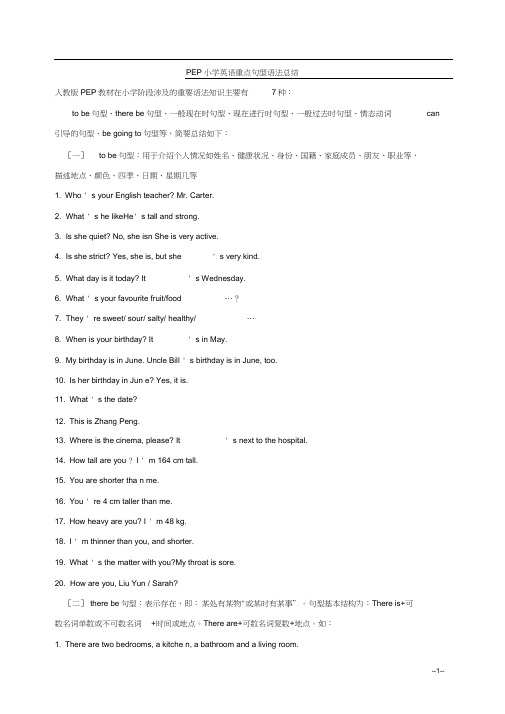
PEP小学英语重点句型语法总结人教版PEP教材在小学阶段涉及的重要语法知识主要有7种:to be句型、there be句型、一般现在时句型、现在进行时句型、一般过去时句型、情态动词can 引导的句型、be going to句型等,简要总结如下:[一]to be句型:用于介绍个人情况如姓名、健康状况、身份、国籍、家庭成员、朋友、职业等,描述地点、颜色、四季、日期、星期几等1. Who ' s your English teacher? Mr. Carter.2. What ' s he likeHe' s tall and strong.3. Is she quiet? No, she isn She is very active.4. Is she strict? Yes, she is, but she ' s very kind.5. What day is it today? It ' s Wednesday.6. What ' s your favourite fruit/food …?7. They ' re sweet/ sour/ salty/ healthy/ …8. When is your birthday? It ' s in May.9. My birthday is in June. Uncle Bill ' s birthday is in June, too.10. Is her birthday in Jun e? Yes, it is.11. What ' s the date?12. This is Zhang Peng.13. Where is the cinema, please? It ' s next to the hospital.14. How tall are you ? I ' m 164 cm tall.15. You are shorter tha n me.16. You ' re 4 cm taller than me.17. How heavy are you? I ' m 48 kg.18. I ' m thinner than you, and shorter.19. What ' s the matter with you?My throat is sore.20. How are you, Liu Yun / Sarah?[二] there be句型:表示存在,即:某处有某物"或某时有某事”。
六年级下英语知识点总结(优秀)

六年级下英语知识点总结(优秀)六年级下册英语知识点复习总结篇一①playbadminton打羽毛球②alwaysdoyourhomework总是做家庭作业③drythedishesaftersupper晚饭后擦干盘子④atthesportsstore在运动品专卖店⑤makelunch做午饭⑥lastweek上周⑦before/afterbreakfast⑧onceayear一年一次⑨wakeup起床动词原形及过去式buy----bought(买)teach----taught(教)think----thought(想)win-----won(赢)do----did(做)lose----lost(丢失)throw----threw(扔)swim----swam(游泳)have----had(有)lie-------lay(躺)say------said(说)forget-----forgot(忘记)begin------bagin(开始)bring-----brought(带来)eat----ate(吃)go-----went(去)isam-----wasare-----were六年级英语知识点大总结篇二六年级英语知识点大总结Unit1 How can I get there?key words(重点单词)museum 博物馆 postoffice 邮局bookstore 书店 cinema 电影院hospital 医院 restaurant 餐馆crossing 十字路口 turn left/ right 左转go straight 笔直走 map 地图next to 与。
相邻 near在。
附近key sentence patterns (重点句型)1. Where is the cinema? 电影院在哪?2. It’s next to the bookstore.它紧邻书店。
3. How can I get there? 我怎样到那儿?4. Turn left at the bookstore. 在书店左转。
六年级下册英语句型总结
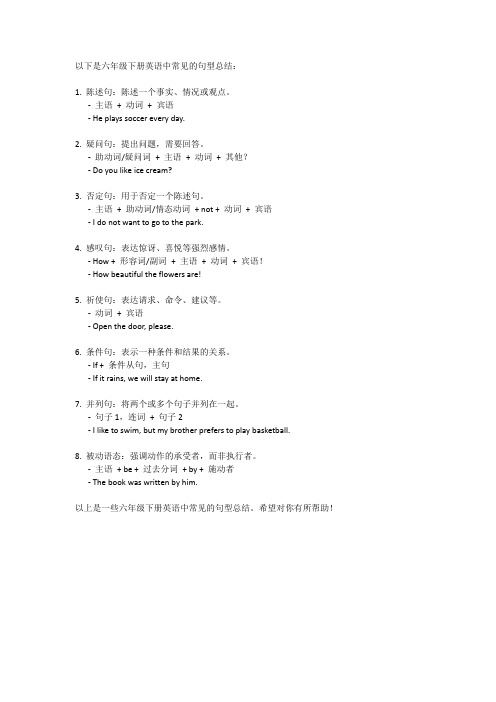
以下是六年级下册英语中常见的句型总结:
1. 陈述句:陈述一个事实、情况或观点。
-主语+ 动词+ 宾语
- He plays soccer every day.
2. 疑问句:提出问题,需要回答。
-助动词/疑问词+ 主语+ 动词+ 其他?
- Do you like ice cream?
3. 否定句:用于否定一个陈述句。
-主语+ 助动词/情态动词+ not + 动词+ 宾语
- I do not want to go to the park.
4. 感叹句:表达惊讶、喜悦等强烈感情。
- How + 形容词/副词+ 主语+ 动词+ 宾语!
- How beautiful the flowers are!
5. 祈使句:表达请求、命令、建议等。
-动词+ 宾语
- Open the door, please.
6. 条件句:表示一种条件和结果的关系。
- If + 条件从句,主句
- If it rains, we will stay at home.
7. 并列句:将两个或多个句子并列在一起。
-句子1,连词+ 句子2
- I like to swim, but my brother prefers to play basketball.
8. 被动语态:强调动作的承受者,而非执行者。
-主语+ be + 过去分词+ by + 施动者
- The book was written by him.
以上是一些六年级下册英语中常见的句型总结。
希望对你有所帮助!。
六年级英语下册知识点句型

六年级英语下册知识点句型六年级英语下册是学生在英语学习中的关键阶段,掌握好各种知识点和句型对于提高英语水平至关重要。
以下是六年级英语下册常见的知识点句型,帮助学生更好地理解和运用英语。
一、单词和词组1. come up with :想出,提出例句:The students came up with some great ideas for the school event.2. take part in:参加例句:Are you going to take part in the school play?3. get along with:与...相处例句:She is friendly and easy to get along with.4. look forward to:期待例句:I am looking forward to the summer vacation.5. make a decision:做决定例句:After careful consideration, he finally made a decision.6. go on a trip:去旅行例句:We are going on a trip to the beach next week.7. be interested in:对...感兴趣例句:He is interested in learning about different cultures.8. be good at:擅长例句:She is good at playing the piano.二、日常用语1. What's your favorite subject?你最喜欢的科目是什么?2. Can you help me with my homework?你能帮我做作业吗?3. Could you please repeat that?你能再重复一遍吗?4. How do you spell this word?这个单词怎么拼写?5. I don't understand. Could you explain it again?我不明白,你能再解释一遍吗?6. I have a question.我有一个问题。
小学六年级下册英语句型.doc

小学六年级下册英语句型一、一般陈述句1、b e结构(is ,am ,are)的一般陈述句:主语+谓语(be)+宾语例子:I am a student.You are a boy.He (She, It) is smart.2、由动词构成的一般陈述句:主语+谓语(动词:时态)例子:I often swim in the lake.(一般现在式)I am swimming in the lake now.(现在进行式)I swam in the lake yesterday. (过去式)I will swim in the lake tomorrow. I am going to swim in the lake next week.(将来式)He swims in the lake.(一般现在式)He is swimming in the lake now.(现在进行式)He swam in the lake yesterday. (过去式)He will swim in the lake tomorrow. He is going to swim in the lake next week. (将来式)3、由there be构成的一般陈述句:there+be例子:There is a man in the room.There are many students in the room.二、否定句1、由be结构(is ,am ,are)的一般否定句:主语+谓语(be)+not+宾语I am not a student.You are not(aren't) a boy.He (She, It) is not(isn't) smart.2、由动词构成的否定句:主语+谓语的否定式(动词:时态)I don't often swim in the lake.(一般现在式)I am not swimming in the lake now.(现在进行式)I didn't swim in the lake yesterday. (过去式)I will not swim in the lake tomorrow. (将来式)I am not going to swim in the lake next week.He doesn't swim in the lake.(一般现在式)He is not swimming in the lake now.(现在进彳亍式)He didn't swim in the lake yesterday. (过去式)He will not swim in the lake tomorrow. (将来式)He is not going to swim in the lake next week.3、由there be构成的一般否定句:there+be+notThere is not(isn't) a man in the room.There are not(aren't) many students in the room.三、一般疑问句1、b e 结构(is ,am ,are)I am a student. Are you a student? Yes, I am. No, I am not.You are a boy. Are you a boy? Yes, I am. No, I am not.He (She, It) is smart. Is he (she, it) smart? Yes, he (she, it) is. No, he (she, it) isn't.2、动词I often swim in the lake. Do you often swim in the lake? Yes, I do. No. I don't.I am swimming in the lake now.Are you swimming in the lake now. Yes, I am. No, I am not.I swam in the lake yesterday.Did you swim in the lake yesterday? Yes, I did. No. I didn't.I will swim in the lake tomorrow.Will you swim in the lake tomorrow? Yes, I will. No, I won't.I am going to swim in the lake next week.Are you going to swim in the lake next week? Yes, I am. No, I am not..He swims in the lake. Dose he swim in the lake. Yes, he dose. No, he doesn't.He is swimming in the lake now.Is he swimming in the lake now? Yes, he is. No, he isn't.He swam in the lake yesterday.Did he swim in the lake yesterday? Yes, he did. No. he didn'tHe will swim in the lake tomorrow.Will he swim in the lake tomorrow? Yes, he will. No, he won't.He is going to swim in the lake next week.Is he going to swim in the lake next week? Yes, he is. No, he isn't..3、there be 结构There is a man in the room.Is there a man in the room? Yes, there is. No, there isn't.There are many students in the room.Are there many students in the room? Yes, there are. No, there aren't.四、特殊疑I可句(what、who、whose、which、when、where、how、why等特殊疑问词开头的疑问句)。
小学英语人教精通版六年级下册重点归纳

小学英语人教精通版六年级下册重点归纳第一单元Unit1 I went to Sanya for my holidays.重点单词:Sun 太阳moon月亮star星星Learn 学习;学到word 单词;词blackboard黑板say 说subject学科but 但是yesterday昨天why 为什么use用重点短语:1.by plane 乘飞机2.at night 在晚上3.at home 在家里4.a lot of 很多5.go to the beach 去沙滩6.do tasks 做任务7.act in drama 表演戏剧8.stay at home 待在家里9.have a party 聚会10.enjoy Spring Festive 过春节11.listen to music 听音乐12.speak English 讲英语13.read English 读英语14.write E n glish 写英语15.talk in English n用英语交谈16.play in English 用英语玩游戏17.enjoy sunbathing享受日光浴18.have an English party举办英语聚会19.enjoy the moon and stars看月亮和醒醒20.learn from each other 互相学习。
重点句型:1. We have learned a lot of English words我. 们学了很多英语单词。
2. We learned from each other我. 们互相学习。
2.What did you do for your holidays?你假期做了什么?3.I went to Sanya.我去了三亚。
4.We are very interested in English我. 们对英语很感兴趣。
5.How did you learn English?你(们)是怎么学英语的?6.We learned English by doing things我. 们通过做事情来学英语。
六年级英语下册语法知识点精选全文
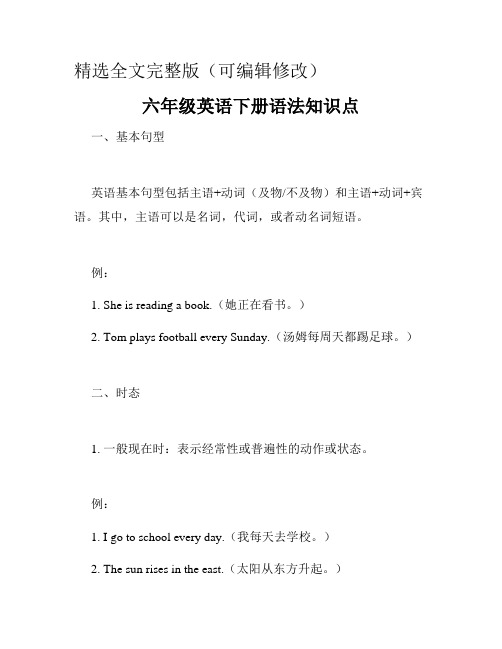
精选全文完整版(可编辑修改)六年级英语下册语法知识点一、基本句型英语基本句型包括主语+动词(及物/不及物)和主语+动词+宾语。
其中,主语可以是名词,代词,或者动名词短语。
例:1. She is reading a book.(她正在看书。
)2. Tom plays football every Sunday.(汤姆每周天都踢足球。
)二、时态1. 一般现在时:表示经常性或普遍性的动作或状态。
例:1. I go to school every day.(我每天去学校。
)2. The sun rises in the east.(太阳从东方升起。
)2. 现在进行时:表示现在正在进行的动作。
例:1. They are playing basketball in the park.(他们正在公园里打篮球。
)2. She is studying for the exam.(她正在为考试学习。
)3. 一般过去时:表示过去发生的动作或状态。
例:1. They visited their grandparents last week.(他们上周拜访了他们的祖父母。
)2. We lived in Paris for two years.(我们在巴黎住了两年。
)三、动词时态的转换动词时态可以通过时态的转换来表达过去、现在和将来的概念。
常见的时态转换有以下几种:1. 一般现在时转换为一般过去时:- am/is/are → was/were- do/does → did- have/has → had例:1. He is a teacher.(他是一名老师。
)→ He was a teacher.(他曾经是一名老师。
)2. They have a dog.(他们有一只狗。
)→ They had a dog.(他们曾经有一只狗。
)2. 一般现在时转换为一般将来时:将动词的原形后加上will。
例:1. She knows the answer.(她知道答案。
六年级英语下册知识点总结

六年级下册知识点总结Unit 1 How Tall Are You?重点单词:Taller, shorter, stronger, older, younger, bigger, heavier, longer, thinner, smaller, funnier, meter, squid, lobster, shark, deep, seal, sperm whale, killer whale 重点句型:1-How tall are you?-I'm 1.60 meters tall/ I'm 160 cm.2-How heavy are you?-I'm 48 kg,-How long are your legs?-76 cm.4 -How big are your feet?-I wear size 17.5 -Who is taller than you?-Tom is taller than me.注:形容词比较级的变化规律:Unit2 What§The Matter,Mike?单词:重点Havea fever, hurt, have a cold, have a toothache, have a headache, have a sore throat, matter, sore, nose, tired, excited, angry, happy, bored, sad, medicine, a little, laugh at重点句型:1 -What's the matter with them?-The robot is tired, the stray man has a headache.-Fine. How are you?-I have a headache / fever / cold / toothache / sore throat.或have the flu.3 -What's the matter, mike?-I feel sick. I have a fever./ My throat is sore, my nose is hurt.4-How does Lisa feel?-She is tired/ sad/happy/excited.5-How are you, Liu Yun? You look sad.-I failed the math test.6-How do you / them feel? /How does he/she feel?-They feel happy./He/She feels happy.Unit 3 Last Weekend重点单词:Watch, wash, clean, play, visit, do, last, weekend, go, to, park, go to swimming, go hiking, go fishing, tongue twister, yesterday, return 重点句型:1-What did you do last weekend/yesterday?-I watched TV / washed the clothes/cleaned the room/played the football/visited grandparents/ played football/went to a park/went swimming/read a book/went fishing/went hiking/-Did you do homework yesterday?-Yes, I did./ No, I didn't.2-What did you do last weekend?-I V-ed……注:动词过去时的变化形式:1、一般情况下,动词词尾加-ed ,如:work ---worked play-played wanted--wanted act --- acted2、以不发音的-e结尾动词,动词词尾加-d,如:live-lived move——moved taste-tasted hope -hoped3、以辅音字母+y结尾的动词,把-y变为-i再加-ed,如:study-studied copy-copied cry-cried carry-carried4、以一个辅音字母结尾的重读闭音节动词,双写词尾辅音字母,再加-ed,如:stop —stopped5、不规则动词的过去式变化规律性不强,须多加记忆。
(人教PEP)六年级英语下册复习资料 全册句型总结
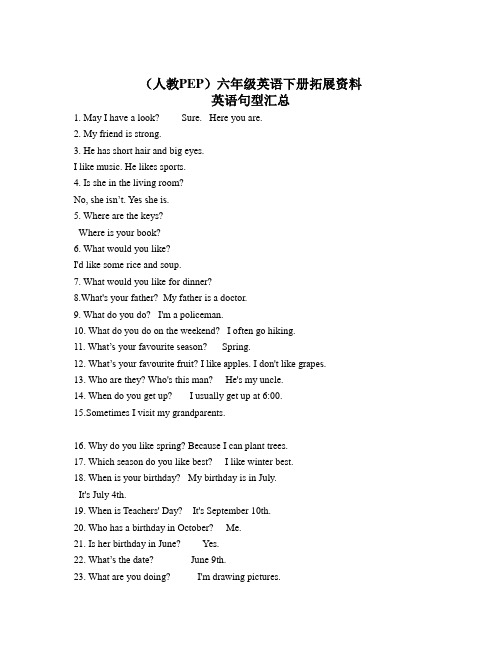
(人教PEP)六年级英语下册拓展资料英语句型汇总1. May I have a look? Sure. Here you are.2. My friend is strong.3. He has short hair and big eyes.I like music. He likes sports.4. Is she in the living room?No, she isn’t. Yes she is.5. Where are the keys?Where is your book?6. What would you like?I'd like some rice and soup.7. What would you like for dinner?8.What's your father? My father is a doctor.9. What do you do? I'm a policeman.10. What do you do on the weekend? I often go hiking.11. What’s your favourite season?Spring.12. What’s your favourite fruit? I like apples. I don't like grapes.13. Who are they? Who's this man? He's my uncle.14. When do you get up? I usually get up at 6:00.15.Sometimes I visit my grandparents.16. Why do you like spring? Because I can plant trees.17. Which season do you like best? I like winter best.18. When is your birthday? My birthday is in July.It's July 4th.19. When is Teachers' Day? It's September 10th.20. Who has a birthday in October? Me.21. Is her birthday in June? Yes.22. What’s the date? June 9th.23. What are you doing? I'm drawing pictures.24. What is your father doing? He's writing an e-mail.25. What do you see? I see two elephants.26. What are they doing? They are drinking water.27. What is Mike doing? He's watching insects.28. Where are they? They are in the woods.29. Are they catching butterflies? No, they aren't.30. They are picking up leaves. Yes, they are.31. Where is Zhang Peng? He's in the woods.32. Is he taking pictures? Yes, he is. No, he isn't. He's playing chess.33. who’s your English teacher?Mr. Carter.34. What’s he like? He's tall and strong.35. Is he quiet? No, he isn't. He's very active.36. What day is it today? It's Wednesday.37. What do you have on Thursdays?We have English, math and science on Thursdays.38. What do you do on Saturdays?I watch TV on Saturdays.39. What do you have for lunch on Mondays?We have tomatoes, tofu and fish.40. What can you do? I can sweep the floor.41. Can you make the bed? NO, I can't. Yes, I can42.There are two bedrooms, a kitchen, a bathroom and a living room.43. There is a mirror, a bed and a big closet.44. Is there a forest in the park?Yes, there is. No, there isn't.45. Are there any pandas in the mountains?No, there aren't.46. Are there any fish in the rivers?Yes, there are.47. Where is the canteen?It's on the first floor.48. What time is it?It's 5 o'clock. It's 6:30.49. It’s time to go to school.It's time for English.50. What colour is it? It's blue.51. Whose is it? It's my T-shirt.52. What’s the weather like in Beijing?It's rainy today.53. who’s that woman? She's my mother.54. Do you like peaches? Yes, I do. No, I don't.55. Nice to meet you. Nice to meet you, too.56. I have a bear. May I have a look? Sure. Here you are.57. Where is the cinema? It's next to the hospital.58. Turn left at the cinema, then go straight.It's on the left.59. What are you going to do on the weekend?I'm going to visit my grandparents this weekend.60. Where are you going this afternoon?I'm going to the bookstore.61. What are you going to buy?I'm going to buy a comic book.62.What's your hobby? I like collecting stamps.63. Does she teach English?No, she doesn't. Yes, she does.64. What does your mother do? She is a TV reporter.65. Where does she work? She works in a car company.66. What should you do then?。
六年级下册英语必考知识点
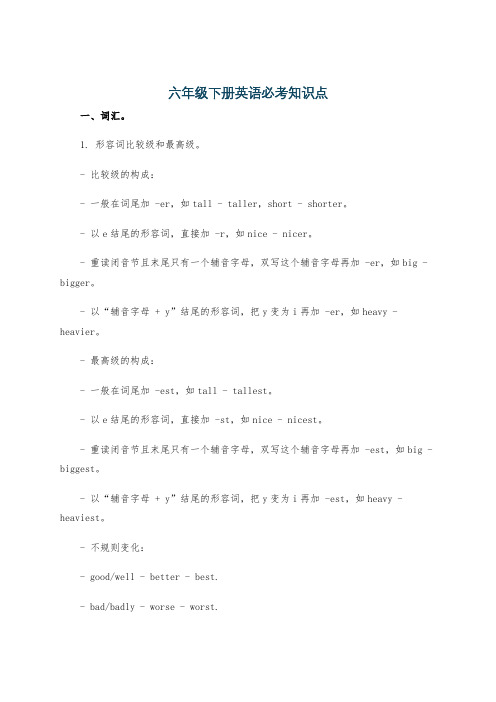
六年级下册英语必考知识点一、词汇。
1. 形容词比较级和最高级。
- 比较级的构成:- 一般在词尾加 -er,如tall - taller,short - shorter。
- 以e结尾的形容词,直接加 -r,如nice - nicer。
- 重读闭音节且末尾只有一个辅音字母,双写这个辅音字母再加 -er,如big - bigger。
- 以“辅音字母 + y”结尾的形容词,把y变为i再加 -er,如heavy - heavier。
- 最高级的构成:- 一般在词尾加 -est,如tall - tallest。
- 以e结尾的形容词,直接加 -st,如nice - nicest。
- 重读闭音节且末尾只有一个辅音字母,双写这个辅音字母再加 -est,如big - biggest。
- 以“辅音字母 + y”结尾的形容词,把y变为i再加 -est,如heavy - heaviest。
- 不规则变化:- good/well - better - best.- bad/badly - worse - worst.- many/much - more - most.- little - less - least.2. 动词的过去式。
- 规则变化:- 一般在词尾加 -ed,如play - played,clean - cleaned。
- 以e结尾的动词,加 -d,如live - lived。
- 重读闭音节且末尾只有一个辅音字母,双写这个辅音字母再加 -ed,如stop - stopped。
- 以“辅音字母 + y”结尾的动词,把y变为i再加 -ed,如study - studied。
- 不规则变化:- go - went.- see - saw.- eat - ate.- have/has - had等。
3. 重点单词。
- 职业类:doctor(医生),teacher(教师),pilot(飞行员),scientist (科学家),artist(艺术家)等。
六年级英语知识点下册句型
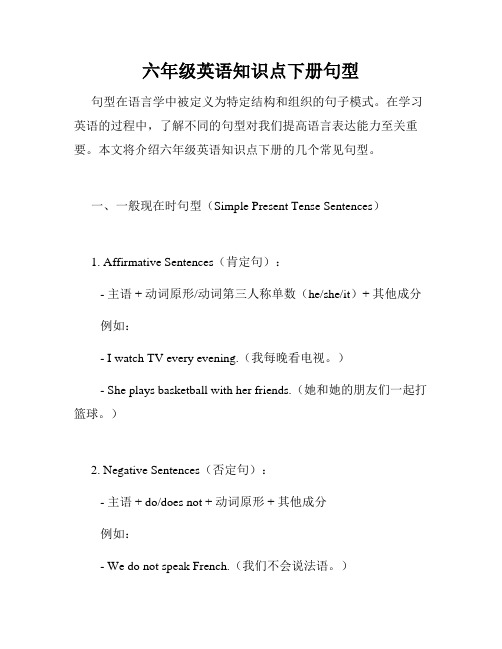
六年级英语知识点下册句型句型在语言学中被定义为特定结构和组织的句子模式。
在学习英语的过程中,了解不同的句型对我们提高语言表达能力至关重要。
本文将介绍六年级英语知识点下册的几个常见句型。
一、一般现在时句型(Simple Present Tense Sentences)1. Affirmative Sentences(肯定句):- 主语 + 动词原形/动词第三人称单数(he/she/it)+ 其他成分例如:- I watch TV every evening.(我每晚看电视。
)- She plays basketball with her friends.(她和她的朋友们一起打篮球。
)2. Negative Sentences(否定句):- 主语 + do/does not + 动词原形 + 其他成分例如:- We do not speak French.(我们不会说法语。
)- He does not like carrots.(他不喜欢胡萝卜。
)3. Interrogative Sentences(疑问句):- Do/Does + 主语 + 动词原形 + 其他成分 + ?例如:- Do you play the piano?(你会弹钢琴吗?)- Does she go to the park on weekends?(她周末去公园吗?)二、一般过去时句型(Simple Past Tense Sentences)1. Affirmative Sentences:- 主语 + 动词过去式 + 其他成分例如:- They visited their grandparents last month.(他们上个月去看望了他们的祖父母。
)- I bought a new book yesterday.(昨天我买了一本新书。
)2. Negative Sentences:- 主语 + did not + 动词原形 + 其他成分例如:- We did not play football after school.(放学后我们没有踢足球。
小学英语六年级下册重点句型汇总
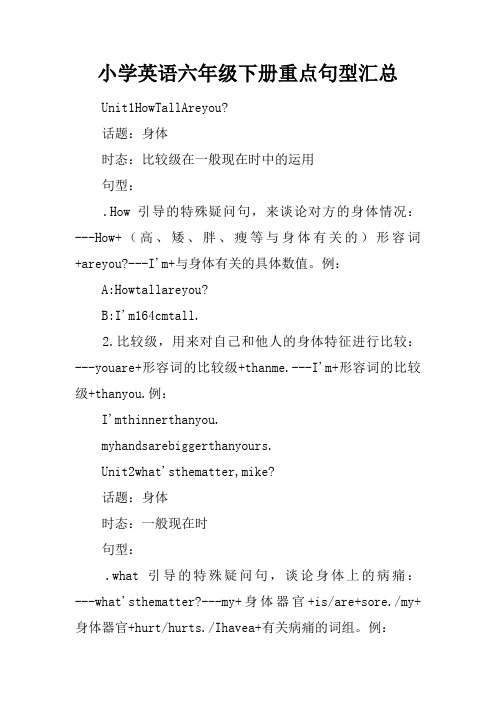
小学英语六年级下册重点句型汇总Unit1HowTallAreyou?话题:身体时态:比较级在一般现在时中的运用句型:.How引导的特殊疑问句,来谈论对方的身体情况:---How+(高、矮、胖、瘦等与身体有关的)形容词+areyou?---I'm+与身体有关的具体数值。
例:A:Howtallareyou?B:I'm164cmtall.2.比较级,用来对自己和他人的身体特征进行比较:---youare+形容词的比较级+thanme.---I'm+形容词的比较级+thanyou.例:I'mthinnerthanyou.myhandsarebiggerthanyours.Unit2what'sthematter,mike?话题:身体时态:一般现在时句型:.what引导的特殊疑问句,谈论身体上的病痛:---what'sthematter?---my+身体器官+is/are+sore./my+身体器官+hurt/hurts./Ihavea+有关病痛的词组。
例:A:what'sthematter,Amy?B:Ihaveacold.mynosehurts.2.How引导的特殊疑问句,谈论人们情绪上的感受:---Howareyou?youlook+与情绪有关的形容词。
---I'm+形容词。
例:A:Howareyou,Liuyun?youlooksohappy.B:yes.I'mexcited.Unit3Lastweekend话题:日常活动时态:一般过去时句型:.what引导的特殊疑问句,就过去已经发生的行为动作进行提问:---whatdidyoudo+时间?---I+动作(did).例:A:whatdidyoudolastweekend?B:IPlayedfootball.2.Did引导的一般疑问句,就过去是否发生了某行为动作进行问答:---Didyou+动词原形?---yes,Idid.No,Ididn't.例:A:Didyoureadbooks?B:yes,Idid.Unit4myHoliday话题:节日时态:一般过去时句型:综合运用where,when,what,How等词,引导特殊疑问句,就过去已经发生的行为动作进行提问:基本句型同上。
- 1、下载文档前请自行甄别文档内容的完整性,平台不提供额外的编辑、内容补充、找答案等附加服务。
- 2、"仅部分预览"的文档,不可在线预览部分如存在完整性等问题,可反馈申请退款(可完整预览的文档不适用该条件!)。
- 3、如文档侵犯您的权益,请联系客服反馈,我们会尽快为您处理(人工客服工作时间:9:00-18:30)。
六年级英语下册重点句型
Unit1
特殊疑问句
How heavy are you? I am 45kg.
How heavy is he/she/Mike? He/ She is 45kg.
How tall are you? I am 156 cm.
How tall is he /she/Mike? He /She is 156 cm.
How old are you? I am 12 years old.
How old is he /she/ Mike? He /She is 12 years old.
How big are your/his /her/Mike’s feet?
I wear size 16. He/she wears size 16.
How long are your legs? My legs are 76 cm.
How long is the pencil? It’s 15cm long.
How large is your room /classroom? It’s 100 square meter.
How far is Guangzhou from here? It’s over 200 km.
陈述句
Iam taller/older/younger/shorter/thinner/heavier/stronger/…
than you/him/her/ Mike.
He/she/Mike is taller/older/younger/shorter/thinner/heavier/stronger/…than me
My hands are bigger than yours/his/hers/Mike’s. (your/his/her/Mike’s hands)
Your /his/her/Mike’s arms are longer than mine.( my arms)
一般疑问句
Are you taller/older/younger/shorter/thinner/heavier/stronger/…
than me/him/her/Mike?
Is he/she/Mike taller/older/younger/shorter/thinner/heavier/stronger/…than me/you/Amy?
Are your /his/her/Mike’s hands smaller than mine?
Unit2
特殊疑问句
How do you/they feel? How are you/they feeling?
I/they feel happy/tired/….. I am/they are happy…
How does he/she/Mike feel/ ? How is he /she/Mike feeling?
He /she/Mike feels happy/…. He/she/Mike is sick/happy…. What’s the matter with you? What’s the matter with you , Mike?
I have a headache/……
What’s the matter with him/her/Mike?
He /she/ Mike has a headache/….
What’s wrong with you/him/her/Mike?
一般疑问句
Are you/they happy /….?
Yes, I am/they are happy /…. No, I’m not /they aren’t happy/…
Is he/she/Mike happy/…?
Yes, he/she/Mike is happy/…No, he /she/ Mike isn’t happy/... Do you/they feel sick/happy?
Yes, I /they feel sick/happy. No, I/ they don’t feel sick/happy? Does he/she/Mike feel sick/happy…?
Yes, he /she/Mike feels sick/ happy.
No, he/she/Mike doesn’t feel sick/happy.
Unit3 and Unit 4
What did you/they/he/she/Mike do 过去的时间?
I/they/he/she/Mike played football.
Where did you/they/he/she/Mike go过去的时间?
I/they/he/she/Mike went to Guangzhou.
When did you/they/he/she/Mike go there?
I/they/he/she/Mike went there yesterday.
How did you/they/he/she/Mike go there?
I/they/he/she/Mike went there by train.
How was your weekend/holiday?
It was fun/busy.
What was the date yesterday? It was April 21st.
What was the weather like yesterday? It was sunny and hot. What day was it yesterday? It was Sunday.
How did you / they/he/she/Mike feel?
I/they/he/she/Mike felt happy. I /he/she/Mike was happy.
They/we were happy.
一般疑问句
Did you/ they/he/she/Mike play football yesterday?
Yes, I/ they/he/she/Mike played football yesterday.
N0, I/ they/he/she/Mike didn’t play football yesterday.
Were you /they happy?
Yes ,I was /they were happy. No, I wasn’t /they weren’t happy. Was he/she/Mike happy?
Yes, he/she/Mike was happy. No, he/she/Mike wasn’t happy.。
